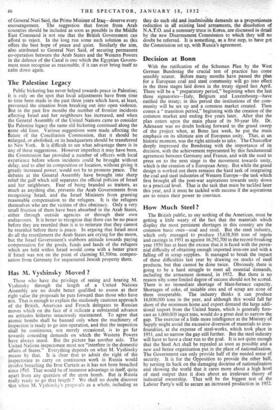How Much Steel?
The British public, to say nothing of the American, must be getting a little weary of the fact that the materials which display the most persistent shortages in this country are the common • basic ones—coal and steel. But the steel industry, which only managed to produce 15,638,500 tons of ingots and castings in 1951 as against 16,292,700 in the record-breaking year 1950 has at least the excuse thatit is faced with the peren- nial difficulty of obtaining enough imported iron-ore and with a falling off in scrap supplies. It managed to break the impact of these difficulties last year by drawing on stocks of steel products, but that cannot be done twice. Obviously, there is going to be a hard struggle to meet all essential demands, including the armament demand, in 1952. But there is no reason why some limited degree of success should not be scored. There is no immediate shortage of blast-furnace capacity. Shortages of coke, of suitable ores and of scrap are none of them insuperable. The industry thinks it can produce 16,000,000 tons in the year, and although this would fall, far short of the minimum home and export demand the large addi- tional import from the United States, which is generally fore- cast as 1,000,000 ingot tons, would do a great deal to narrow the gap. The exercise of a little more intelligence at the Ministry of Supply might avoid the excessive diversion of materials to iron- foundries, at the expense of steel-works, which took place in 1951, and so narrow the gap still further. But the steel industry will have to have a clear run to the goal. It is not quite enough that the Steel Act shall be repealed as soon as possible and a new and better organisation put in the place of nationalisation. The Government can only provide half of the needed sense of security. It is for the Opposition to provide the other half, by turning its back on the damaging doctrine of nationalisation and showing the world that it cares more about a high level of steel output than it -does about an irrelevant theory of industrial ownership. That will be the biggest test of the Labour Party's will to secure an increased production in 1952.


































 Previous page
Previous page